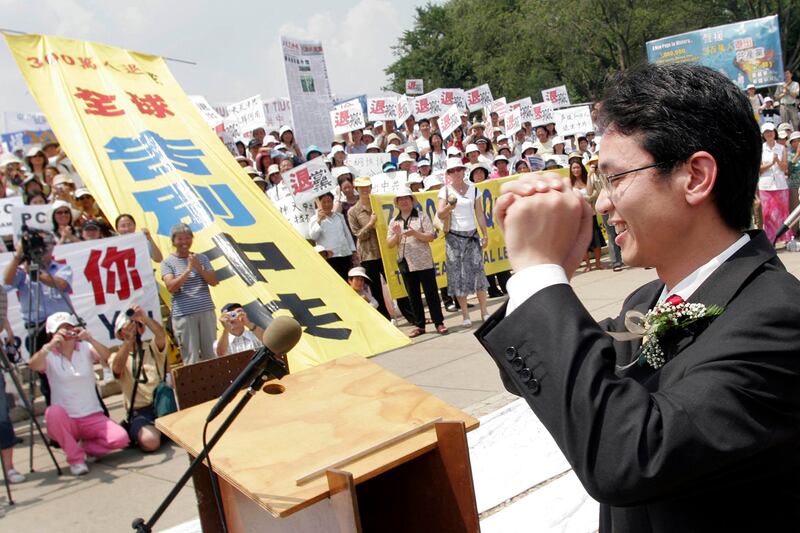Updated Jan. 21, 2025, 4:56 p.m. ET
Beijing has changed the rendering of U.S. Secretary of State Marco Rubio’s name in Chinese, sparking speculation that officials might want to get around their own travel ban, in an apparent olive branch to President Donald Trump, analysts said on Tuesday.
The U.S. Senate confirmed Marco Rubio as secretary of state on Monday, unanimously voting in the Florida senator who sees China as the “biggest threat” to U.S. security, hours after the inauguration of Trump for his second term as president.
Rubio was slapped with retaliatory Chinese sanctions twice in 2020 after he criticized Chinese human rights abuses in Xinjiang and Hong Kong.
China has apparently changed one of the Chinese characters it uses to represent Rubio’s name in Chinese -- lu, bi and ào.
A Ministry of Foreign Affairs news release dated Jan. 16 used the characters 鲁 (lǔ) 比 (bǐ) and 奥 (ào) in its official transcription of Rubio’s surname. Earlier official transcriptions had used 卢 (lú) as the first syllable.
Chinese put the family name first, followed by a two- or one-character given name, so Rubio effectively now has a new Chinese surname.
Yet there seemed to be some confusion as not everyone was using the new name. The foreign ministry repeated Rubio’s new Chinese name in its official transcript of Tuesday’s regular news briefing, but state broadcaster CCTV was still using the old version in news reports dated Jan. 21.
However, some records show that going back to 2016 in official Chinese media, both versions have been used.
A foreign ministry spokesperson in Beijing declined to say whether those sanctions -- which include a travel ban to China -- will now be lifted.
“China will firmly safeguard its national interests,” spokesperson Guo Jiakun told a regular news briefing in Beijing on Tuesday.
“At the same time, it is necessary for high-level officials from China and the United States to maintain contact in an appropriate manner,” he said.
The Chinese Embassy in Washington didn’t respond directly to a query about Rubio’s name in official Chinese documents and instead reiterated Guo’s comment.
‘Most dangerous near peer adversary’
At his confirmation hearing on Wednesday, Rubio described China as America’s “biggest threat.”
“If we stay on the road we’re on right now, in less than 10 years, virtually everything that matters to us in life will depend on whether China will allow us to have it – everything from the blood pressure medicine we take to what movies we get to watch,” Rubio told the hearing.
RELATED STORIES
US Senate confirms Marco Rubio as secretary of state
China Levels Retaliatory Sanctions on US Officials Over Xinjiang Measures
Beijing sees Trump presidency as ‘critical’ juncture for Sino-US ties
“The Communist Party of China … is the most potent and dangerous near peer adversary this nation has ever confronted,” Rubio said.
Xi has said he’s ready to work with the Trump administration, but has also warned that both countries stand to “lose from confrontation,” as Trump announced plans to impose tariffs of at least 60% on Chinese imports.
Such tariffs have yet to be announced.
State media have characterized the second Trump presidency as a “critical” juncture that could improve ties with the United States.
Face-saving way
The change in Rubio’s Chinese name will have been approved at a high level, former Chinese diplomat and defector Chen Yonglin said.
“The translation of names of important figures in China is determined through the translation office of the Ministry of Foreign Affairs and the translation office of Xinhua News Agency,” Chen told RFA Cantonese on Tuesday. “It seems that a decision was made about this name after internal discussions.”

He said the move could be a face-saving way for the Chinese authorities to allow Rubio to travel to the country despite sanctions, without having to withdraw them.
“China is now in trouble domestically and internationally, and has begun to go back to softer tactics,” Chen said.
British Chinese writer Ma Jian said the government is playing “word games,” as usual.
“This kind of name change is very typical for China,” Ma said. “It’s also normal behavior for the Ministry of Foreign Affairs, which is using it as a way to compromise.”
“It’s the only solution they can find ... because if the relationship with the United States hits a new low, this will be a huge blow to the Chinese Communist Party, so they need to save face right now,” he said.
Soong Kuo-cheng of Taiwan’s National Chengchi University said the Trump administration’s “America First” policy would give Beijing scant room for maneuver.
“The United States ... doesn’t want to give the Chinese Communist Party any opportunity to compete with it, so there’s no room for compromise,” Soong said. “It will continue to confront Beijing.”
Spokesperson Guo Jiakun told reporters in Beijing on Tuesday: “China is willing to strengthen dialogue and communication with the United States, properly manage differences and expand mutually beneficial cooperation based on the principles of mutual respect, peaceful coexistence, and win-win cooperation.”
But he was indirectly critical of the U.S. withdrawal from the World Health Organization, saying the role of the global body “should be strengthened, not weakened.”
“China will continue to support the WHO in fulfilling its responsibilities, deepen international public health cooperation, enhance global health governance, and promote the construction of a community of shared health for humanity,” Guo said.
Regarding Trump’s claim that China was effectively “operating” the Panama Canal and that the U.S. would take it back, Guo said: “I have no additional information to share.”
Translated by Luisetta Mudie. Edited by Malcolm Foster.
Updated to say that both versions of Rubio’s name have appeared in official media.
